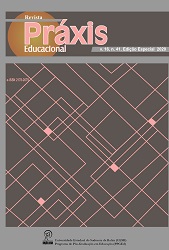NARRATIVAS AUTOBIOGRÁFICAS: ELEMENTOS PARA EDUCAÇÃO EM DIREITOS HUMANOS
DOI:
https://doi.org/10.22481/praxisedu.v16i41.6447Palavras-chave:
Narrativas, Educação em Direitos Humanos, Educação do CampoResumo
Neste trabalho buscamos compreender elementos que marcaram trajetórias de licenciados em Educação do Campo no que tange a violações de direitos dos povos campesinos e, contribuir com um cenário de interesse acerca do uso de narrativas autobiográficas como instrumento formativo e de pesquisa. Para isso, no contexto de uma disciplina de Educação em Direitos Humanos de um curso de Licenciatura em Educação do Campo, narrativas autobiográficas serviram de eixo condutor para a condução do ensino e a sustentação da aprendizagem ao longo de um semestre. As produções narrativas, um total de dezessete, foram analisadas utilizando como inspiração a Análise de Conteúdo. Os dados foram categorizados em três eixos: escolarização, saúde e acesso à terra. Como resultados, emergiram à compreensão as mais significativas problemáticas acerca de violações de direitos humanos a que se veem submetidos, transversais a todas as histórias no sentido da busca por acesso à Educação, Saúde e Terra. Em todas elas, a presença constante de um sucateamento, e por conseguinte uma limitação ao acesso a esses direitos, em meio a necessidade de lutas permanentes para modificar esse cenário. Além disso, foi possível considerar que o processo de revisitar suas narrativas, com base na compreensão que alguns aspectos podem ter sido negligenciados ou ofertados de modo inadequado, se configurou como importante instrumento formativo de promoção dos Direitos Humanos. Nesse sentido, ao reconhecerem os direitos que lhes deveriam ter sido assegurados, os estudantes conseguiram identificá-los e problematizá-los em um processo de reconhecimento e empoderamento de si enquanto sujeitos de direito.
Downloads
Metrics
Downloads
Publicado
Como Citar
Edição
Seção
Licença
Copyright (c) 2020 Práxis Educacional

Este trabalho está licenciado sob uma licença Creative Commons Attribution-ShareAlike 4.0 International License.
Você é livre para:
Compartilhar - copia e redistribui o material em qualquer meio ou formato; Adapte - remixe, transforme e construa a partir do material para qualquer propósito, mesmo comercialmente. Esta licença é aceitável para Obras Culturais Livres. O licenciante não pode revogar essas liberdades, desde que você siga os termos da licença.
Sob os seguintes termos:
Atribuição - você deve dar o crédito apropriado, fornecer um link para a licença e indicar se alguma alteração foi feita. Você pode fazer isso de qualquer maneira razoável, mas não de uma forma que sugira que você ou seu uso seja aprovado pelo licenciante.
Não há restrições adicionais - Você não pode aplicar termos legais ou medidas tecnológicas que restrinjam legalmente outros para fazer qualquer uso permitido pela licença.










